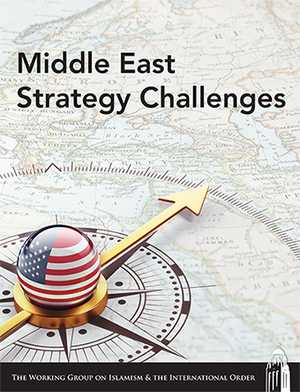Of the foreign policy challenges that face the new administration in Washington, perhaps none is more significant than that of the Middle East. From spawning terrorism to supplying the bulk of the world’s fuels to destabilizing Europe with a wave of migration, its problems reverberate far beyond its borders. Under the Obama administration, Iran and Russia have been allowed to supplant the United States as a regional hegemon, and the result has been destabilizing to the point of threatening the international order. The region is of vital American interest, and the United States must reclaim a role and shape a policy that acknowledges and confronts the strategies pursued by both Tehran and Moscow. To this end, the group of scholars and intellectuals who came together under the auspices of The Herbert and Jane Dwight Working Group delved deeply into these questions. Their analysis and proposals lay the groundwork for a strategy going forward.

MIDDLE EAST STRATEGY CHALLENGES
Ayatollah Machiavelli
by Karim Sadjadpour
The Islamic Republic of Iran and its Supreme Leader Ayatollah Ali Khamenei have arguably become the most powerful country, and leader, in the Middle East. A Machiavellian combination of ruthlessness, radicalism, and realism—underpinned by a 2500-year history of subtle statecraft—has helped Tehran fill political vacuums created by the Iraq war and Arab uprisings. Though American and Iran share numerous common interests—and adversaries—as long as Iran continues to define itself as a revolution rather than a nation-state cooperation will be minimal, containment will be necessary, and confrontation may be unavoidable.
Syria-Iraq: Limiting Iranian Influence Implies Returning To Realpolitik
by Fabrice Balanche
Destroying the Islamic State (IS) and limiting the influence of Iran is a difficult project. The United States has more capabilities in Syria than in Iraq to destroy IS and limit Iran. The Sunni Arab tribes of the Euphrates Valley no longer support the Islamic State and are ready to join those who will liberate them, which explains the effectiveness of the Syrian Democratic Forces (Kurdish-Arab) against IS. Thus the liberation of Raqqa could thus take place in fall 2017, provided Turkey does not launch an offensive against the Syrian Kurds.
The Follies Of Democracy Promotion
by Samuel Tadros
President Obama’s election was warmly greeted in Egypt by both the country’s leader and population. In Cairo, Obama promised a new beginning, not only in America’s relationship with Egypt, but the whole Muslim world. By the time he left office, the American Egyptian relationship was in shambles. In this essay, Samuel Tadros examines the illusions that shaped Obama’s adventure in Egypt in pursuit of an imaginary transition to democracy, offering a cautionary tale for the Trump administration. If the US Egyptian alliance is to be strengthened and Egypt is to survive the regional upheaval, President Trump should forgo the illusions Washington holds about the country and base his strategy toward Egypt not on Egypt as it should be, but on Egypt as it is.
Jihadism On Its Own Terms
by Cole Bunzel
In this essay Cole Bunzel argues that jihadism, the modern movement in Sunni Islam identified with al-Qaida and the Islamic State, is best understood on its own terms, rather than in terms of terrorism, violent extremism, or the larger Islamist movement. Examining the jihadis’ own writings and ideas and emphasizing their self-perception as a distinct movement—“the jihadis,” “the jihadi current”—he explains the nature and contours of their movement as it has developed during the past decades to the present day. As jihadism grows increasingly popular, it has also become increasingly divided.
Ten Proposals On The Middle East For The New US Administration
by Russell A. Berman, Charles Hill
Of the foreign policy challenges that face the new administration in Washington, perhaps none is more significant than that of the Middle East. From spawning terrorism to supplying the bulk of the world’s fuels to destabilizing Europe with a wave of migration, its problems reverberate far beyond its borders. Under the Obama administration, Iran and Russia have been allowed to supplant the United States as a regional hegemon, and the result has been destabilizing to the point of threatening the international order. The region is of vital American interest, and the United States must reclaim a role and shape a policy that acknowledges and confronts the strategies pursued by both Tehran and Moscow. To this end, the group of scholars and intellectuals who came together under the auspices of The Herbert and Jane Dwight Working Group delved deeply into these questions. Their analysis and proposals lay the groundwork for a strategy going forward.










